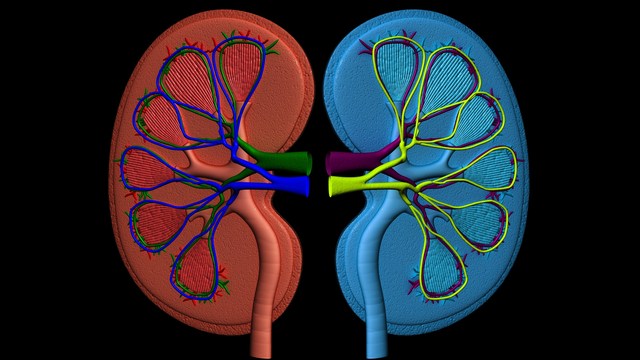 Photo: Getty Images
Photo: Getty Images
According to the UNC Kidney Center, ʺDiseases that injure GLOMERULI (plural for glomerulus) are called GLOMERULAR DISEASES. Laboratory analysis of the urine from people who have glomerular disease often shows protein in the urine (proteinuria) and blood in the urine (hematuria).ʺ
The National Institute of Diabetes and Digestive and Kidney Diseases (NIDDK) website stated, ʺBlood enters the kidneys through arteries that branch inside the kidneys into tiny clusters of looping blood vessels. Each cluster is called a glomerulus, which comes from the Greek word meaning filter. There are approximately 1 million glomeruli, or filters, in each kidney.ʺ
Glomerular disease is a disease of the kidneys. Glomerular kidney disease generally involves inflammation of the membrane tissue around the kidneys or the scarring or hardening of the arteries within the kidneys.
According to the NIDDK, symptoms of glomerular disease include:
• Swelling in parts of the body (edema)
• Large amounts of protein in the urine (proteinuria)
• Inefficient filtering of wastes from the blood (reduced glomerular filtration rate)
• Low blood protein (hypoproteinemia)
• Blood in the urine (hematuria)
Glomerular disease can be diagnosed with a urinalysis, blood test, renal imaging tests (ultrasound or x-ray), and/or a kidney biopsy. These types of tests may also be able to identify the cause of glomerural disease. Also, these tests can identify and confirm the type of glomerural disease.
Glomerular disease can be caused by an infection, other diseases (lupus, diabetes, etc.), or a drug which damages or scars the kidneys. Also, there are different types of glomerural diseases. Some of those disease types include:
• Anti-glomerular basement membrane disease
• Primary glomerular disease
• Thin glomerular basement membrane disease
• Glomerular basement membrane disease
• Secondary glomerular disease
• Chronic glomerular disease
Some forms of glomerural disease to not respond to treatment and others types might not require treatment. Glomerular disease treatment will depend upon your type of glomerural disease.
For example, if you were diagnosed with glomerural disease because of an infection, the kidney disease will improve once the infection has been treated with prescription medication. Your doctor may prescribe steroids to treat your kidney disease.
In cases of severe glomerural kidney disease, your doctor may recommend plasmapheresis (PLAZ-muh-fer-EE-sis). According to the NIDDK, plasmapheresis is ʺa medical treatment in which the blood is treated outside the body to remove harmful antibodies, and then returned to the patient.ʺ
To prevent further damage to your kidneys, it is important to monitor your blood pressure. If you are prone to high blood pressure, your doctor may prescribe high blood pressure medication to manage your blood pressure and to prevent further kidney damage.
References:
Glomerular Diseases - National Kidney and Urologic Diseases Information Clearinghouse. Home Page - National Kidney and Urologic Diseases Information Clearinghouse. Retrieved November 15, 2011, from
http://kidney.niddk.nih.gov/kudiseases/pubs/glomerular
Glomerulonephritis - PubMed Health. National Center for Biotechnology Information. Retrieved November 15, 2011, from
http://www.ncbi.nlm.nih.gov/pubmedhealth/PMH0001515
UNC Kidney Center. UNC Kidney Center. Retrieved November 15, 2011, from
http://www.unckidneycenter.org/kidneyhealthlibrary/glomerulardisease.html#Glom_Diseases
Review November 15, 2011
by Michele Blacksberg RN
Edited by Jody Smith





Add a CommentComments
There are no comments yet. Be the first one and get the conversation started!